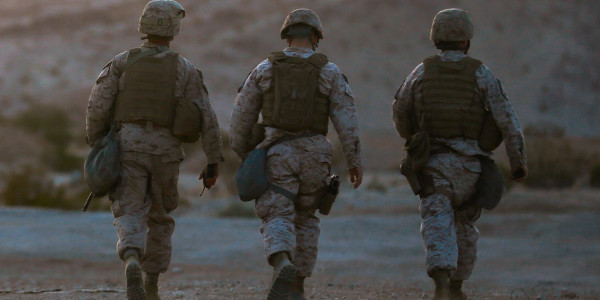

Of the 13 enlisted Marines I served directly alongside seven years ago at Marine Corps Air Station Cherry Point, North Carolina, all of us are either working in the private sector or have remained in the service. One of us made it to Yale and wrote a book. One is a human rights lawyer working international justice cases in Kenya. Several of us are business owners. Most of us are college grads. A few own homes.
With our military service behind us, we’ve closed ranks and started doing amazing things. While this may sound exceptional to some, we are not unique.
Yet we, the overwhelmingly successful majority of America’s millennial veterans, are an untold story.
See, home ownership doesn’t make headlines. Homelessness does. Business ownership doesn’t fly off the presses. Unemployment does. Self-efficacy isn’t nearly as sexy as the plaintive cries of the handful of malingering scumbags demanding every lush benefit in the book. The hundreds of thousands of veterans living quiet family lives don’t have nearly the twisted glamour of the few who choose violence each year.
The bulk of millennial veterans are neither heroes nor victims. We’re simply men and women who, in the words of American poet Robert Service, “heard the challenge, learned the lesson, paid the cost.” We now apply a greater depth of self-knowledge, work ethic and situational awareness to everything we do, and as a result, we do pretty freaking well. Let me unpack our awesomeness.
Millennial veterans are overwhelmingly civic minded.
Nearly all of us say we intend to continue to serve once we leave the military. Look no further than veteran disaster relief organization Team Rubicon to see this intention in action. During the past few years, this relatively new organization has saved American communities millions of dollars in disaster recovery costs. That’s the good news. The better news is that we’re just getting started.
Most of us are employed.
The unemployment rate for veterans is much better than that of the civilian workforce. We’re supremely hirable, loyal and hardworking. We get team dynamics. We know how to show up on time, and our judgment is tends to be finely honed. Which leads me to my next point…
We also make great business owners.
Veterans are 42 times more likely to become business owners as they are to become homeless. Once we decide to launch a business, we’re also twice as likely as our civilian counterparts to succeed. We understand how to plan, how to lead and how to accomplish the mission. Looking for your next investment? Seek out a vetrepreneur.
We’re networking machines.
Some of my best friends and most valued mentors are veterans. Encouragement, support, advice, and high morale flow like class six rapids through the canyon of veteran goodwill. We’ve organized ourselves into formal associations and powerful informal referral and mentoring networks. We’re constantly on the lookout for new business opportunities for each other. #awesome
If we have invisible wounds, we seek help.
More veterans than ever before are reporting post-traumatic stress. This is a good thing. Combat is stressful. Rape is stressful. The loss of your buddies is stressful. Once we’re aware that we can’t muscle through trauma alone, we start to get help through Veterans Affairs, private psychologists, religious counselors, and social communities.
But we’re not satisfied with “treatment.” We want more. When retired Marine Gen. James Mattis recently suggested that trauma could be used as a starting point for growth to a stronger, healthier place, the response was overwhelmingly positive. Themes of meaning, continued purpose, and hope resonate strongly with millennial veterans.
Hello, America. We’ve been here all along.
Lydia Davey is an entrepreneur and U.S. Marine Veteran. She is the founder of Moriah Creatives Public Relations.
